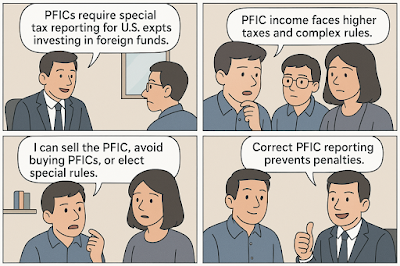International PFIC Reporting for Expats with Foreign Mutual Funds
International PFIC Reporting for Expats with Foreign Mutual Funds
For U.S. expats living abroad, investing in foreign mutual funds might seem like a natural financial decision.
However, these investments can trigger complex and costly tax reporting obligations under IRS PFIC rules.
Failure to comply can result in severe penalties, interest charges, and even double taxation.
This guide breaks down everything U.S. persons need to know about PFICs (Passive Foreign Investment Companies) and how to manage the reporting process.
📌 Table of Contents
- What Is a PFIC?
- How PFIC Rules Affect U.S. Expats
- Filing IRS Form 8621
- Strategies to Minimize PFIC Tax
- Alternatives to Foreign Mutual Funds
- Further Resources
📘 What Is a PFIC?
A Passive Foreign Investment Company (PFIC) is defined by the IRS as a non-U.S. corporation that meets either of these tests:
- Income Test: 75% or more of its gross income is passive (interest, dividends, capital gains).
- Asset Test: 50% or more of its assets produce or are held for producing passive income.
Most foreign mutual funds, ETFs, and some insurance wrappers qualify as PFICs.
🌍 How PFIC Rules Affect U.S. Expats
PFICs are subject to punitive U.S. tax treatment under IRC Sections 1291–1298.
Instead of being taxed like U.S.-based mutual funds, PFIC income is allocated across holding periods and taxed with interest penalties.
This makes them unattractive for U.S. citizens unless carefully structured or reported.
📝 Filing IRS Form 8621
Each PFIC must be reported annually on IRS Form 8621, even if no income was received.
Form 8621 includes detailed disclosures of fund holdings, elections (e.g. QEF or MTM), and tax calculations.
Many expats fail to file due to complexity, leading to audit risks and FATCA violations.
It’s best to work with a CPA experienced in international tax.
🧠 Strategies to Minimize PFIC Tax
Some common tactics include:
- Avoiding PFICs entirely and investing through U.S.-based brokerage accounts
- Making a Qualified Electing Fund (QEF) election, if the fund provides necessary documentation
- Using a Mark-to-Market (MTM) election to report annual gains
- Switching to individual foreign stocks or U.S. mutual funds
Timely elections must be made when first acquiring a PFIC; retroactive elections are extremely limited.
💼 Alternatives to Foreign Mutual Funds
To reduce reporting burdens and improve tax outcomes, expats can consider:
- ETFs listed on U.S. exchanges (e.g. via Schwab International)
- U.S.-registered mutual funds with global exposure
- Direct purchase of global equities through U.S. brokerages
- Robo-advisors for expats that avoid PFICs (e.g. Creative Planning, MyExpatAdvisor)
Each has its own pros and cons, so seek tailored advice.
🔗 Further Resources
Explore more about international tax compliance with these helpful guides:
Important Keywords: PFIC reporting, IRS Form 8621, expat tax compliance, foreign mutual funds, international tax strategy
